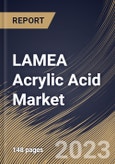The personal care industry has witnessed the incorporation of acrylic acid in skincare and hair care products. Acrylic polymers contribute to formulating gels, creams, and lotions, providing desired textures and functionalities. Acrylic polymers are valued for forming stable and aesthetically pleasing gels in skincare products. Gels are popular formulations for various skincare applications, including moisturizers, eye creams, and spot treatments. Creams are a staple in skincare routines, providing hydration, nourishment, and barrier protection. Acrylic polymers are often employed to optimize the rheological properties of creams, ensuring a smooth and luxurious application. These polymers contribute to the stability of emulsions, preventing phase separation and enhancing the overall sensory experience of the product. Some acrylic polymers possess film-forming properties, creating a protective film on the skin or hair surface. This film can help enhance the longevity of skincare and hair care products, providing a barrier against environmental factors and contributing to the effectiveness of the formulation.
Moreover, acrylic acid-based polymers are utilized in water treatment processes for their ability to flocculate and remove impurities. These polymers aid in improving the efficiency of water treatment plants and addressing environmental concerns. Acrylic acid-based polymers are known for their flocculation and coagulation properties. In water treatment, these polymers are introduced to the water to facilitate the aggregation of fine particles and colloids. The formation of larger flocs aids in the removal of suspended solids and impurities, making the water suitable for further treatment.
The construction industry is driven by ongoing urbanization and the demand for real estate developments in the UAE, including residential and commercial properties. Acrylic-based products, such as coatings, adhesives, and sealants, are integral to various construction applications. As per the Dubai Statistics Center, in 2022, there were 13,236 buildings under construction in Dubai and 1,941 completed buildings. Rapid urbanization has increased demand for housing, commercial spaces, and public amenities. Cities like Dubai and Abu Dhabi have grown substantially, requiring more infrastructure and real estate developments. Therefore, the rising construction sector in the LAMEA region is expected to drive the demand for acrylic acid.
The Brazil market dominated the LAMEA Acrylic Acid Market by Country in 2022, and would continue to be a dominant market till 2030; thereby, achieving a market value of $367 million by 2030. The Argentina market is registering a CAGR of 7% during (2023 - 2030). Additionally, The UAE market would showcase a CAGR of 6.2% during (2023 - 2030).
Based on End-user, the market is segmented into Diapers, Surface Coatings Industry, Adhesives & Sealants Industry, Plastic Additives Industry, Water Treatment Industry, Textiles Industry, Surfactants Industry, and Others. Based on Derivative Type, the market is segmented into Acrylic Esters, Acrylic Polymer, and Others. Based on countries, the market is segmented into Brazil, Argentina, UAE, Saudi Arabia, South Africa, Nigeria, and Rest of LAMEA.
The market research report covers the analysis of key stake holders of the market. Key companies profiled in the report include Mitsubishi Chemical Holdings Corporation, Arkema S.A., BASF SE, The Dow Chemical Company, Evonik Industries AG (RAG-Stiftung), LG Chem Ltd. (LG Corporation), Formosa Plastics Group, Sasol Limited, Nippon Shokubai Co., Ltd., and Merck KGaA.
Scope of the Study
Market Segments Covered in the Report:
By End-user (Volume, Kilo Tonnes, USD Billion, 2019-2030)
- Diapers
- Surface Coatings Industry
- Adhesives & Sealants Industry
- Plastic Additives Industry
- Water Treatment Industry
- Textiles Industry
- Surfactants Industry
- Others
By Derivative Type (Volume, Kilo Tonnes, USD Billion, 2019-2030)
- Acrylic Esters
- Acrylic Polymer
- Others
By Country (Volume, Kilo Tonnes, USD Billion, 2019-2030)
- Brazil
- Argentina
- UAE
- Saudi Arabia
- South Africa
- Nigeria
- Rest of LAMEA
Key Market Players
List of Companies Profiled in the Report:
- Mitsubishi Chemical Holdings Corporation
- Arkema S.A.
- BASF SE
- The Dow Chemical Company
- Evonik Industries AG (RAG-Stiftung)
- LG Chem Ltd. (LG Corporation)
- Formosa Plastics Group
- Sasol Limited
- Nippon Shokubai Co., Ltd.
- Merck KGaA
Unique Offerings
- Exhaustive coverage
- The highest number of Market tables and figures
- Subscription-based model available
- Guaranteed best price
- Assured post sales research support with 10% customization free
Table of Contents
Companies Mentioned
- Mitsubishi Chemical Holdings Corporation
- Arkema S.A.
- BASF SE
- The Dow Chemical Company
- Evonik Industries AG (RAG-Stiftung)
- LG Chem Ltd. (LG Corporation)
- Formosa Plastics Group
- Sasol Limited
- Nippon Shokubai Co., Ltd.
- Merck KGaA








